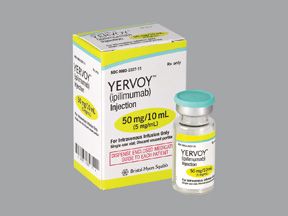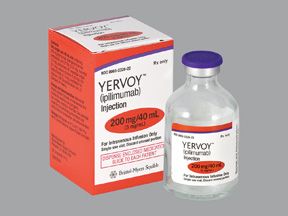If you have a certain type of cancer, your doctor might suggest Yervoy as a treatment option for you. It’s a prescription drug used in adults to treat:
- non-small cell lung cancer (NSCLC)
- melanoma (a form of skin cancer)
- colorectal cancer
- kidney cancer
- liver cancer
- pleural mesothelioma (a form of cancer that affects the outer lining of the lungs and chest)
Yervoy is also used to treat some types of melanoma and colorectal cancer in certain children.
Yervoy comes as a liquid solution in a vial. It’s given as an intravenous (IV) infusion (an injection into your vein given over time).
The active ingredient in Yervoy is ipilimumab. An active ingredient is what makes a drug work.
Yervoy belongs to a group of drugs called monoclonal antibodies. These are a kind of immunotherapy treatment. They help your immune system fight cancer.
This article describes the dosages of Yervoy, as well as its strengths and details about its usage. To learn more about the drug, see this in-depth article.
Note: This article covers Yervoy’s usual dosing schedules, which are provided by the drug’s manufacturer. But your doctor will prescribe the Yervoy dosage that’s right for you.
The information below covers the usual dosages of Yervoy for the conditions it’s used to treat.
What is Yervoy’s form?
Yervoy comes as a liquid solution in a vial. You’ll receive it as an intravenous (IV) infusion (an injection into your vein given over time).
What strengths does Yervoy come in?
Yervoy comes in one strength of 5 milligrams (mg) per 1 milliliter (mL) of solution and is available in two sizes:
- 50 mg per 10-mL vial
- 200 mg per 40-mL vial
What are the usual dosages of Yervoy?
The dosage of Yervoy you’re prescribed depends on your age, weight, and the condition the drug’s being used to treat.
The information below describes dosages that are commonly used or recommended.Your doctor will determine the best dosage to fit your needs.
Dosage for non-small cell lung cancer (NSCLC)
The NSCLC dosing of Yervoy is based on your body weight and certain other factors. It’s used along with other medications to treat certain kinds of NSCLC. The dosage of Yervoy is 1 mg per kilogram (kg) of body weight. This is given once every 6 weeks for up to 2 years based on how you respond to treatment.
Yervoy is also used along with Opdivo (nivolumab) as a first-line treatment in certain people with NSCLC that is metastatic. (This means it has spread to other areas of your body.)
It’s also used as a first-line treatment in certain people whose NSCLC has spread or returned after another treatment. But in these cases, it’s used with both Opdivo (nivolumab) and two cycles of a kind of chemotherapy.
Dosage for melanoma
The dosing for melanoma (a form of skin cancer) depends on the kind of skin cancer and your body weight. It may be used alone or in combination with another treatment.
- The dosing of Yervoy for melanoma that can’t be removed with surgery or is metastatic (has spread to other areas of the body) is 3 mg/kg of body weight. It’s given every 3 weeks for up to four doses, either alone or with Opdivo (nivolumab). When given with nivolumab, treatment is continued with nivolumab alone for as long as it’s safe and effective.
- Yervoy can also be used to prevent cancer from returning following surgery to remove the melanoma and cancerous lymph nodes. In these situations, the dosing schedule is 10 mg/kg of body weight given every 3 weeks for up to four doses. Then the dose is 10 mg/kg given once every 12 weeks for up to 3 years.
Dosage for colorectal cancer
Yervoy is used to treat colorectal cancer that has certain traits. It’s used along with another type of medication when your colorectal cancer has:
- certain gene mutations (abnormal changes)
- metastasized (spread to other parts of your body)
- grown or returned after chemotherapy treatment with:
- Camptosar (irinotecan)
- Eloxatin (oxaliplatin)
- fluoropyrimidine drugs, such as Xeloda (capecitabine)
The dosing of Yervoy for colorectal cancer is 1 mg/kg of body weight. This is given once every 3 weeks with Opdivo (nivolumab) for up to four doses. After this, nivolumab is given alone for as long as it’s safe and effective.
Dosage for kidney cancer
Yervoy is used to treat kidney cancer that:
- is advanced (has spread to other parts of your body) and
- has a moderate or low risk of getting better
The dosing is 1 mg/kg of body weight given once every 3 weeks. It’s used along with another drug called Opdivo (nivolumab).
Yervoy is given for up to a maximum of four doses for this use. After this, nivolumab is used alone for as long as it’s working and safe for you.
Dosage for liver cancer
Yervoy is used in combination with Opdivo (nivolumab) to treat a kind of liver cancer called hepatocellular carcinoma. The dosing of Yervoy for this use is 3 mg/kg of body weight given once every 3 weeks for up to four doses. After this, treatment is continued with nivolumab alone for as long as it’s safe and effective for you.
Note: This combination of Yervoy and nivolumab is given after treatment with another medication called Nexavar (sorafenib).
Dosage for pleural mesothelioma
Yervoy is used to treat pleural mesothelioma (a kind of lung cancer that affects the outer lining of the lungs and chest) that can’t be removed with surgery. This type of cancer is usually caused by exposure to asbestos.
The dosing is 1 mg/kg of body weight given once every 6 weeks. It’s used together with Opdivo (nivolumab). It may be used for up to 2 years, as long as it’s safely and effectively treating your cancer.
What’s the dosage of Yervoy for children?
Yervoy is used to treat certain kinds of cancer in children ages 12 years and older. These cancers include:
- Melanoma that is metastatic (has spread to other areas of the body) or cannot be removed with surgery. The dosage for melanoma is the same as that used in adults. (See “Dosage for melanoma” above for details.)
- Colorectal cancer that has certain traits. Usage and dosage for children ages 12 years and older is the same as for adults. (See “Dosage for colorectal cancer” above for details.)
Is Yervoy used long term?
Yervoy may be used as a long-term treatment for some kinds of cancer. How long your Yervoy treatment lasts depends on the type of cancer it’s being used to treat and other factors.
- For adjuvant* treatment of melanoma, you may receive treatment for up to 3 years, as long as it’s safe and effective for you.
- For lung cancer and pleural mesothelioma, Yervoy may be used for up to 2 years, as long as it’s safe and effective for you.
Yervoy is not used long term for all types of cancer. You may receive up to a maximum of four doses of Yervoy to treat the following:
- colorectal cancer
- liver cancer
- kidney cancer
- melanoma that’s metastatic (spread to other areas of the body) or that can’t be removed with surgery
* Adjuvant treatment is used to reduce the risk of cancer coming back after another type of treatment, such as surgery.
Dosage adjustments
Dosage adjustments of Yervoy are usually not needed. But the rate at which you receive your infusion may need to be adjusted in certain cases. For example, if you have serious side effects while receiving your Yervoy infusion, your doctor may pause or slow your treatment until your symptoms improve. They may also stop your treatment completely if you have a severe reaction.
Your doctor can provide more information about any adjustments you may need.
Yervoy is given as an intravenous (IV) infusion (an injection into your vein given over time). This is done by a healthcare professional in a doctor’s office or a clinic.
Your dosage and the administration time (how long it takes to receive your infusion) can depend on several factors. It usually takes 30 minutes to receive a Yervoy infusion for most types of cancer it’s used to treat. But the infusion time for melanoma is 90 minutes.
Factors that may affect your dosage and administration time include:
- the type of cancer Yervoy is being used to treat
- how you react to the infusion treatment
Your doctor or the healthcare professional administering your dose will monitor you carefully during your infusion and after treatment.
The dosage of Yervoy you’re prescribed may depend on several factors. These include:
- the type and severity of the condition Yervoy is being used to treat
- your body weight
- other medications you’re taking
Yervoy is given at a doctor’s office or clinic by a healthcare professional. They’ll usually schedule your appointments. If you miss your regularly scheduled dose, call your doctor’s office. They’ll help you reschedule your appointment so you can receive your missed dose.
You could also consider using a reminder tool, such as setting an alarm or downloading a reminder app on your phone.
The sections above describe the usual dosages provided by the drug’s manufacturer. If your doctor recommends Yervoy for you, they’ll prescribe the dosage that’s right for you.
Talk with your doctor if you have questions or concerns about your current dosage. Here are some examples of questions you may want to ask:
- Can my dosage of Yervoy be changed if I’m having side effects?
- Would a lower dosage of Yervoy still work to treat my condition?
- Should my dosage change if Yervoy isn’t working well enough for me?
Q:
Will my Yervoy dosage change if I develop hepatitis during treatment?
AnonymousA:
No. In most cases, you won’t need a dosage adjustment. But depending on the severity of your reaction, you may need treatment adjustments. In studies of Yervoy, the drug has caused hepatitis in some people. This is because, in some cases, your immune system may attack healthy cells in your liver and cause inflammation. If the inflammation is serious, it can cause hepatitis.
You have an increased risk of hepatitis or other immune system-related reactions if you’re taking other medications that have the same side effect. An example is if you’re taking Opdivo (nivolumab) in combination with Yervoy.
Your doctor will monitor how your liver is working before and during your Yervoy treatment. If you develop symptoms of liver damage, call your doctor’s office right away.
Symptoms of liver damage can include:
- jaundice (yellowing of the whites of eyes or skin)
- dark-colored urine
- severe nausea and vomiting
- pain on the right side of your belly
If you develop hepatitis, your doctor will likely stop your Yervoy treatment and treat your liver condition. They may then have you restart Yervoy if your symptoms go away. But if you’ve had a severe reaction, they’ll have you stop Yervoy treatment permanently.
Your doctor can provide more information about immune system-related reactions that are possible with Yervoy treatment.
The Healthline Pharmacist TeamAnswers represent the opinions of our medical experts. All content is strictly informational and should not be considered medical advice.Disclaimer: Healthline has made every effort to make certain that all information is factually correct, comprehensive, and up to date. However, this article should not be used as a substitute for the knowledge and expertise of a licensed healthcare professional. You should always consult your doctor or another healthcare professional before taking any medication. The drug information contained herein is subject to change and is not intended to cover all possible uses, directions, precautions, warnings, drug interactions, allergic reactions, or adverse effects. The absence of warnings or other information for a given drug does not indicate that the drug or drug combination is safe, effective, or appropriate for all patients or all specific uses.


